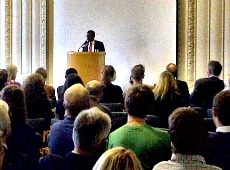Former President Mohamed Nasheed has spoken of the close relationship between climate change, human rights, and democracy during separate addresses to the Danish parliament and the University of Copenhagen this week.
Discussing concerns over political instability in the Maldives that have been raised by NGOs such as Amnesty Intentional since President Dr Mohamed Waheed came to power last year, Nasheed accused the current government of reversing “hard won freedoms” and awarding “Islamic extremists” with cabinet positions.
He also claimed that the prospect of the Maldives becoming a “radicalised, authoritarian stronghold” would have negative connotations well beyond the country’s borders.
“In many ways, [extremists] set the tone of Government communications and they are busy trying to indoctrinate the people with a misguided version of Islam,” Nasheed said.
The office of President Waheed – who entered into office through a controversial transfer of power on February 7, 2012 – today dismissed Nasheed allegations that Islamic extremists were serving in the government.
“I urge Mr Nasheed to stop spreading lies to promote his political agenda. I call on him to engage professionally,” President’s Office Media Secretary Masood Imad said via SMS today.
Senior government figures have earlier this year criticised some of the recent findings published about the Maldives by Amnesty International, accusing the group of publishing reports without conducting research.
During his visit to the Danish capital, Nasheed also met with current and former Danish Ministers, high-level officials, supporters, as well as gave an interview to local tv news show DR2 Dagen.
Nasheed, who is a globally recognised high-profile advocate for climate justice, expounded on how he believed environmental issues, human rights, and political stability are increasingly intertwined.
“The fight against climate change is a human rights issue and the way we respond to it will shape not just our environment, but also geopolitical reality – for generations to come,” he stated while speaking at the University of Copenhagen yesterday (April 16).
“Bad energy policy is not just polluting our planet, it is polluting our politics, warping international relations.”
“New balance of power”
Nasheed gave a lecture to the University of Copenhagen highlighting the “corrupting influence of fossil fuels” on energy politics and how this has clashed with the newly-founded Maldivian democracy.
“The politics of energy is polluting international relations, just as it pollutes the air, casting a shadow over much of the world and holding back clean energy,” he stated.
“It is the invisible force holding nations in thrall to dictators, causing conflicts and repressing human rights, a suffocating inertia that holds back democracy and development.”
Nasheed addressed how “the fight for fossil fuel resources has shaped the world” for over a century, but now “the time has come for a reformation in energy politics; one that values human rights above mineral rights.”
While fossil fuels have “driven companies to corruption, governments to repression, and nations to war, the new resources – solar, wind, waves – are much more widely distributed…there are no ‘resource fields’ to fight over.”
Clean energy is about a significant shift in the established geopolitical order, a shuffling of the deck in the great game, not just about rewiring the world economy, Nasheed explained.
“Carbon emissions”
 “If we turn our backs on corrupting influence of fossil fuels, if we reject the polluting in pursuit of the beautiful, we can protect the world around us. We can deliver sustainable economic growth. And we can do so whilst putting development and democracy first,” he stated.
“If we turn our backs on corrupting influence of fossil fuels, if we reject the polluting in pursuit of the beautiful, we can protect the world around us. We can deliver sustainable economic growth. And we can do so whilst putting development and democracy first,” he stated.
“For the first time since the Industrial Revolution, it is now technologically, economically and politically feasible for people to get their energy sustainably.
Nasheed said it was important that climate change not be underplayed as “some abstract risk,” claiming that the lives and freedoms of people all over the world were threatened if no action was taken to address environmental concerns meaningfully.
“I know it is possible, because we had a plan to do it in the Maldives. A fully costed plan, approved by the World Bank, to go carbon neutral. The only reason we didn’t was because we were rudely interrupted by a coup!” Nasheed exclaimed.
“Radicalised, authoritarian stronghold”
Nasheed also gave a speech to the Danish Parliament that reiterated similar environmental themes, but with an emphasis on the Maldives’ 2008 democratic transition.
A year prior to the Copenhagen Accords – the first time that big emitters from the developed and the developing world all agreed to cut carbon emissions – the Maldives had transitioned from former President Maumoon Abdul Gayoom’s 30-year authoritarian rule to democracy, Nasheed explained.
“Positive changes such as ‘Basic freedoms’ – freedoms which been repressed for generations – began to take hold,” said Nasheed.
“The Maldives was being hailed by NGOs as a model of liberal, Islamic democracy,” he added.
Nasheed provided the Danish parliament with a brief narrative account of the police and military mutiny on February 7, 2012, which he alleged was controlled by “Gayoom, and his allies, alongside Islamic extremists keen to re-establish the old order.”
“[Gayoom’s] former dictatorship organised the coup because they could see the edifice of their economic and political power crumbling,” he explained. “It was crumbling because Maldivians had rejected authoritarianism, rejected feudalism and largely rejected Islamic extremism.”
 Nasheed also added that the prospect of the Maldives becoming a “radicalised, authoritarian stronghold” was a threat for many people.
Nasheed also added that the prospect of the Maldives becoming a “radicalised, authoritarian stronghold” was a threat for many people.
“It is a threat to the hundreds of thousands of Europeans who holiday there every year. It is a threat to neighbouring democracies, such as India. And it is a threat to the stability of the wider Indian Ocean, through which 40% of world trade passes,” he said.
“A democratic Maldives is not only your friend; it is also the best guarantor of your interests,” he emphasised.
Free and fair elections
Domestically, Nasheed is presently being tried in the Hulhumale’ Magistrate Court over the controversial detention of Chief Judge of the Criminal Court Abdulla Mohamed in January 2012.
However, Nasheed has maintained that the trial, presently on hold pending a High Court decision on the legitimacy of judges appointed to hear the former president’s case, is politically motivated to try and prevent free and fair elections from occurring this September.
He highlighted recent conclusions of both local and international experts into the present status of the country’s judiciary to support his claims.
“The United Nations Special Rapporteur says the court is bias and politicised. This view is shared by Amnesty International and the UN Human Rights Committee,” he said.
